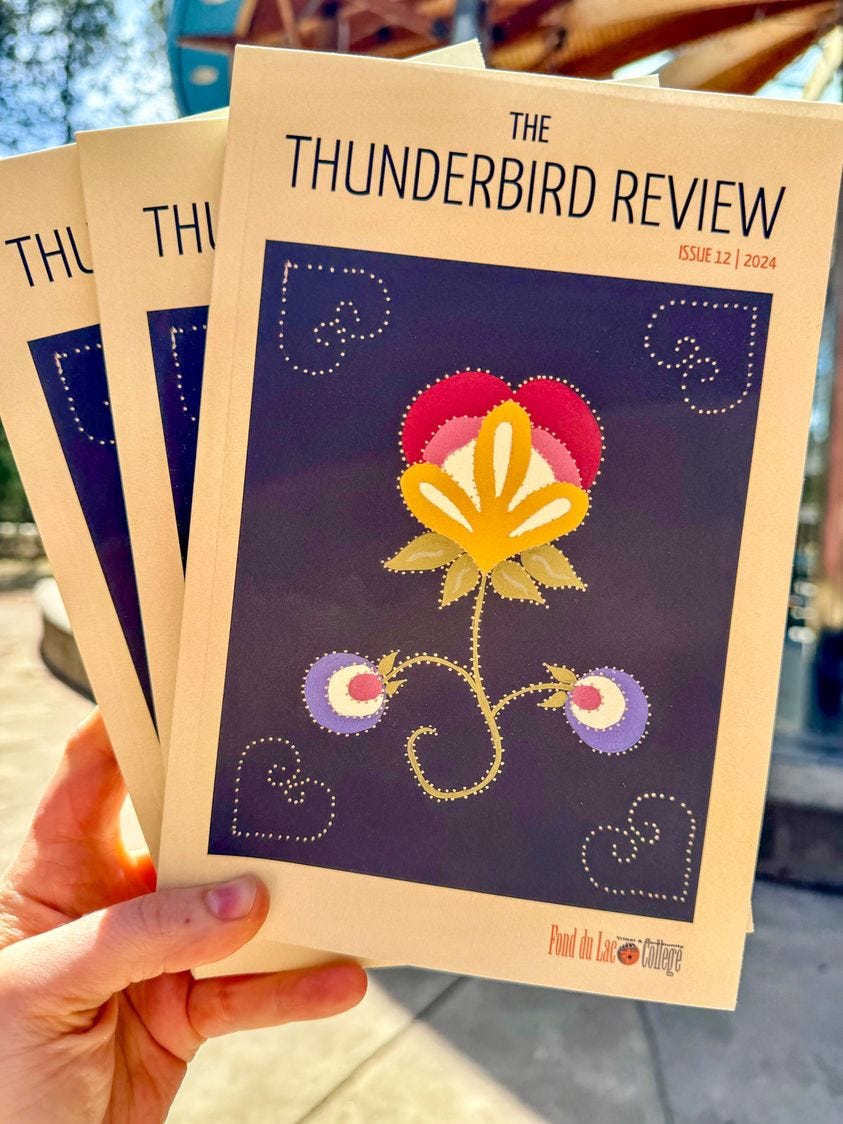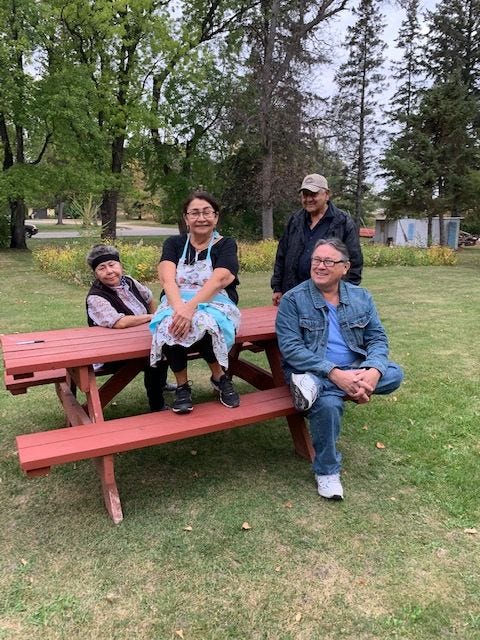This short work of creative nonfiction which appears below has recently been published in The Thunderbird Review, the literary journal of the Fond du Lac Tribal and Community College in Cloquet, Minnesota. It was an honor to be selected for inclusion by guest editor, Linda Legarde Grover, novelist and short story writer. Her most recent novel, A Song Over Miskwaa Rapids (University of Minnesota Press, 2023), is a story involving allotment land and how the past is present, no matter how hard we try to forget.

Scooped
The smell of melting snow tickled Don Kakaygeesick’s nose as he looked out the open window of his second-grade classroom. The April sunshine had turned the playground to mud. Don sat at a desk in a brand new classroom with white cinder block walls and a green chalkboard in 1967.
Warroad Public School had added a third addition to the three-story brick schoolhouse, originally built in 1917, because enrollment had grown to almost 700 students. About 30 of them were Ojibwe. Every morning, elder Tom Lightning passed by in his canoe on the Warroad River, waved to the children on their way up the path to the doors of the schoolhouse, and called out the greeting, “Boozhoo, Boozhoo.”
In the middle of that April afternoon, Don heard his name called over the intercom, instructing him to come to the principal’s office. There he saw his siblings: Karen, Martha, Kenny, and Kelly. They were told they would be going for a ride and nothing more. His parents, Robert Sr. and Florence, who were working at the Northwest Angle at the timber mill, were not notified.
A woman from the Roseau County Welfare Office put the five youngest Kakaygeesick children in her car and drove west on Highway 11. She explained there wasn’t a single family in the county who could take all of them, so it was up to them to decide who would go with one family and who would go with another. Although only 10 years old, Karen was the eldest of them. She doesn’t remember it quite the same, but Don told me she decided the two youngest brothers should stay together. Kenny and Kelly were left with a family living on a farm not far from Greenbush, about 45 miles west of Warroad. The welfare lady drove north and left Karen, Don, and Martha in foster care on another family farm.
They later learned their older brother, John, age 16, had also been called out of his high school classroom and sent to Badger, Minnesota, to stay with a foster family. John walked the 35 miles home. “I never ran away. I walked away.”
Their eldest brother, Robert Jr., had already left Warroad for college. Their mother, Florence, and her mother, Grandma Rose, had saved money for his tuition and sent him off to Wisconsin in a new suit. Robert wasn’t too sure he wanted to go. “I just got out of school. I didn’t know that I wanted any more of that.” Yet Robert had enrolled that fall and begun his formal art education when his siblings disappeared in spring from Warroad Public School.
Karen, Don, and Martha were placed with Clem and Helen K— in the township of Polonia, north and west of Greenbush. Clem’s parents had come from Poland as early settlers to Roseau County around 1897. When he came home from WWII, Clem took over the family farm, married Helen, and raised a daughter and three sons.
When Karen, Don and Martha arrived on the farm in 1967, Clem and Helen’s eldest son and daughter had already left home. The other two boys helped Clem keep the farm going. The Kakaygeesick children replaced their middle son in the fields when he graduated from high school later that year. Don and Wayne, their youngest son, were closer in age. Many years later, Wayne was riding his sports ATV in Warroad when he met Don on the street. Don told me Wayne greeted him like his long-lost brother. It took Don by surprise to have Wayne embrace him. Turns out Clem and Helen had never told Wayne that he’d been adopted and only recently had he learned the truth for himself. Wayne said he now thought of Don as his brother as much as he did the other two.
I asked Don if he had seen Wayne recently. He hadn’t seen him since.
As foster children, Don and his sisters caught the school bus on the county road to Greenbush. Closer to town, the bus would pick up their younger brothers, Kenny and Kelly, and they all attended Greenbush Elementary School. Kenny and Kelly lived with another Polish family in the St. Aloysius Catholic Church parish.
One of their Greenbush elementary school classmates, Aliza, remembered Don from grade school a half-century later. “He would eat an entire apple. The whole thing! Core and seeds and all. We all thought that was strange.” She said the other children didn’t play with the Kakaygeesick children or interact with them. “They kept to themselves.”
“Clem sure did a lot of ear-pulling. You might get your hand slapped,” Don reminisced. “Helen would grab Karen around the upper arm and leave bruises and scratches from her iron grip.” Don said they never spanked them, but they were strict. “The welfare lady came and she brought us children down in the basement to talk to us. Karen’s arms were bruised and she spoke up.”
Karen remembered the social worker had been concerned enough to move her to a different foster family in Crookston, 140 miles from Warroad. What had been so painful for Karen was that she had wanted Don and Martha to get away from there, too. The social worker had found her a safe home, but there had been only one bed available. That family had children of their own, plus two other foster children. Karen suffered for years from guilt, knowing she’d left her siblings behind there.
Don and Martha lived in a state of terror. It scared them to watch Clem spank Wayne. They tried to do everything they were told, but never seemed to do it right. Not allowed to use the indoor plumbing, the Kakaygeesick children had to use the outhouse, even in the winter. Once a week, Helen scalded and scrubbed their skin in a big metal tub. Don and Martha peed in their beds which would enrage her. They faced daily humiliations for it.
At Christmas time, Robert and Florence Kakaygeesick were allowed to visit their children on the farm and brought them presents. They had continued to work at the lumber camp on the Northwest Angle and couldn’t convince authorities to release them back into their custody.
“One year I got a model garage with cars. But I only got to play with it that one day,” Don recalled. Helen picked it up after his parents left and Don never saw it again. In 1970, his parents brought him an Apollo 11 model kit for Christmas. He studied the box and all the parts and looked forward to working on it. Again, Helen took it from him and it disappeared.
They never knew when to expect Helen to fly off the handle in a rage, or what they had done to provoke her.
Martha ran from her wrath and once hid in the basement under the staircase. Her eyes adjusted to the darkness as she listened to the woman stomp around angry upstairs. It was then she saw the cookie tin.
On a shelf with canned tomatoes, beans, pickles and beets was a twelve-inch round metal tin with a lid. Martha carefully lifted the lid and smelled sweet vanilla. Her fingers felt the flat rounds and pulled one out. She put it on her tongue. It melted away the fear, the pain, the anger with goodness. She took two more, for Don and Karen, and slid the lid back on.
A couple of weeks before Martha died in November of 2022, Don asked Martha if she remembered those bruises on Karen’s arms.
“Yes.” She nodded her head somberly and sat silent for a moment. Then her eyes flashed like morning sunshine creeping over the horizon as a smile swept across her face. “Do you remember how good those sugar cookies tasted?”





So painful to read, Jill. My heart goes out to this family. I wonder how many children were required to decide the fates of their siblings, to break up their own families. How many parents had their children stolen from them. Thank you for bringing us this story.
Congratulations Jill on the honor of being included in the Fond du Lac literary journal. You keep on telling us about our history so these atrocities won’t be repeated, for learning and healing as Margaret Holt says. As well as for more “compassionate leaders and less harmful consumption.” Thanks to you both.